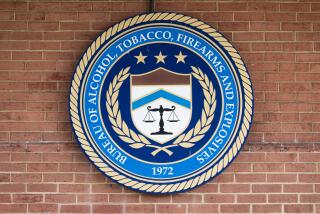Jurors Get Crash Course in Shady Transactions Used in Scheme : Trial Begins for 2 Charged With Bank Fraud
- Share via
The trial of two men charged in a $25-million bank fraud began in U.S. District Court Thursday, with the prosecutor using an elaborate set of color-coded charts in an attempt to explain the complex financial transactions to the jurors.
Assistant U.S. Atty. Leon Weidman portrayed defendants Kimball Dean Richards and Thomas E. Curnow as two of the architects of a scheme that victimized 15 financial institutions--including such blue chip lenders as Great Western Financial, General Electric and John Hancock Mutual Life Insurance. The financial institutions were sold leases on recording equipment that for the most part didn’t exist, he said.
While not denying what happened, attorneys for the defendants said their clients are not to blame. Defense attorney Harlan Braun told the jury that his client Richards “did not have the sophistication, background or intelligence to pull this bank fraud off.”
In his opening statement, prosecutor Weidman said that between 1982 and 1987, Richards gave prospective lenders phony financial statements and tax returns for a string of entertainment firms he operated called the Consolidated Allied Cos.
$100,000 Annual Salary
The statements indicated that Consolidated Allied had annual earnings of more than $5 million and held more than $10 million in cash in an entity called the Motion Picture Workers Credit Union, he said.
Those financial statements, he said, prompted the financial institutions to provide financing for equipment that Consolidated supposedly purchased through Curnow’s company, T-C Audio, and a Huntington-Beach-based commercial finance firm called Riviera Capitol.
In reality, Weidman said, Consolidated Allied was “a total fraud” with no income or cash, and the credit union was “nothing more than a button on a phone” in Consolidated Allied’s Santa Fe Springs offices. Curnow was paid $100,000 a year merely to provide Consolidated Allied with false invoices for the non-existent equipment, he said.
By the time the fraud was discovered in early 1987, the lenders had provided more than $23 million in financing for less than $3 million worth of equipment, and Consolidated Allied’s lease payments were running about $1 million a month, according to the prosecutor.
In his opening statement, Richards’ attorney Braun pointed the finger at someone who is not on trial. Braun blamed the problems on Riviera Capital President Robert Bernfeld, who is set to go on trial in April for his part in the alleged scheme. Bernfeld has pleaded not guilty and in court documents has blamed Richards for what happened.
Braun described Richards a “naive, in some ways stupid, flamboyant and glib rock promoter” who was “consistently deceived and manipulated” by Bernfeld.
Braun also alleged that the fraud scheme “was an inside job” involving employees of the finance companies that provided the money.
“You can’t defraud 15 institutions out of $25 million without some banker being on the take,” he said.
The fraud charges are the most recent in a long string of legal and financial troubles for the 32-year-old Richards, the son of former state Sen. Richard Richards (D-Los Angeles), who died recently of cancer at age 72.
Prosecutor Weidman also took note in his presentation of the younger Richards’ free-spending life style.
During 1984 and 1985, Richards spent large sums of money attempting to create an image for his company as a major player in the recording industry. He outfitted a state-of-the-art recording studio with a $137,000 Jacuzzi room and a shark aquarium. He assembled a fleet of telephone-equipped automobiles--including a Rolls Royce, a Mercedes limousine, a Porsche, a BMW and a $65,000 Ferrari that was given as a 21st birthday present to the company’s principal recording artist, Luis Cardenas.
Richards traveled all over the world--staying at the best hotels, eating in the best restaurants and riding in chauffeured limousines, often accompanied by armed bodyguards and off-duty policemen hired to provide a motorcycle escort.
Prosecutor Weidman said Thursday that it was all paid for with “stolen” money.
More to Read
Sign up for Essential California
The most important California stories and recommendations in your inbox every morning.
You may occasionally receive promotional content from the Los Angeles Times.













